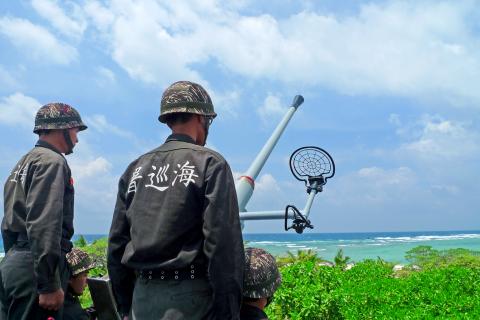Vietnam is unlikely to attack Taiwan’s military facility on the remote Itu Aba, also known as Taiping Island (太平島), in the South China Sea, President Ma Ying-jeou (馬英九) said yesterday.
Ma was speaking at an event at Greater Taichung’s China Medical University marking the sixth anniversary of his 2008 inauguration.
In light of territorial tensions in the region, Ma was asked whether Vietnam might attack Taiping Island, the largest of the Spratly Islands (Nansha Islands, 南沙群島).

Photo: Lo Tien-pin, Taipei Times
“Our assessments indicate it is very unlikely that [an attack] could happen,” Ma said. “First, the troops at the base on Taiping Island are selected from our Marine Corps and they are very capable soldiers. Second, Taiping Island is easy to defend and difficult to attack.”
“Most importantly, there will be political ramifications behind any military operation involving the Nansha Islands,” Ma said.
He added that the Ministry of National Defense General Staff Headquarters has strategic defense plans and reinforcements can be deployed quickly to Itu Aba.
Ma was asked why the national defense budget had not reached the target of 3 percent of GDP.
“The US government is always saying that Taiwan does not allocate enough money for national defense and therefore is unable to procure more weapons from the US,” Ma said.
The government does not lack money for arms procurements from the US, Ma said.
Before he became president in 2008, the previous government allocated money to buy US weapons, but was unable to make the purchase.
“The unspent money was returned to the government’s general budget and accounting department, which was a waste of government budget allocation. It was quite a pity,” the president said.
“If the US can inform us in advance that there are weapons available for purchase, we will certainly have enough money to buy them,” Ma said.
Itu Aba is 1,600km from Taiwan proper and is also claimed by China, Vietnam and Philippines.
Reinforcements can reach the island from Taiwan in four hours using C-130 transport aircraft, Deputy Minister of National Defense Andrew Hsia (夏立言) said earlier this week, adding that Cheng Kung-class frigates can reach the island in 36 hours in favorable weather.

Right-wing political scientist Laura Fernandez on Sunday won Costa Rica’s presidential election by a landslide, after promising to crack down on rising violence linked to the cocaine trade. Fernandez’s nearest rival, economist Alvaro Ramos, conceded defeat as results showed the ruling party far exceeding the threshold of 40 percent needed to avoid a runoff. With 94 percent of polling stations counted, the political heir of outgoing Costa Rican President Rodrigo Chaves had captured 48.3 percent of the vote compared with Ramos’ 33.4 percent, the Supreme Electoral Tribunal said. As soon as the first results were announced, members of Fernandez’s Sovereign People’s Party

EMERGING FIELDS: The Chinese president said that the two countries would explore cooperation in green technology, the digital economy and artificial intelligence Chinese President Xi Jinping (習近平) yesterday called for an “equal and orderly multipolar world” in the face of “unilateral bullying,” in an apparent jab at the US. Xi was speaking during talks in Beijing with Uruguayan President Yamandu Orsi, the first South American leader to visit China since US special forces captured then-Venezuelan president Nicolas Maduro last month — an operation that Beijing condemned as a violation of sovereignty. Orsi follows a slew of leaders to have visited China seeking to boost ties with the world’s second-largest economy to hedge against US President Donald Trump’s increasingly unpredictable administration. “The international situation is fraught

MORE RESPONSIBILITY: Draftees would be expected to fight alongside professional soldiers, likely requiring the transformation of some training brigades into combat units The armed forces are to start incorporating new conscripts into combined arms brigades this year to enhance combat readiness, the Executive Yuan’s latest policy report said. The new policy would affect Taiwanese men entering the military for their compulsory service, which was extended to one year under reforms by then-president Tsai Ing-wen (蔡英文) in 2022. The conscripts would be trained to operate machine guns, uncrewed aerial vehicles, anti-tank guided missile launchers and Stinger air defense systems, the report said, adding that the basic training would be lengthened to eight weeks. After basic training, conscripts would be sorted into infantry battalions that would take

GROWING AMBITIONS: The scale and tempo of the operations show that the Strait has become the core theater for China to expand its security interests, the report said Chinese military aircraft incursions around Taiwan have surged nearly 15-fold over the past five years, according to a report released yesterday by the Democratic Progressive Party’s (DPP) Department of China Affairs. Sorties in the Taiwan Strait were previously irregular, totaling 380 in 2020, but have since evolved into routine operations, the report showed. “This demonstrates that the Taiwan Strait has become both the starting point and testing ground for Beijing’s expansionist ambitions,” it said. Driven by military expansionism, China is systematically pursuing actions aimed at altering the regional “status quo,” the department said, adding that Taiwan represents the most critical link in China’s